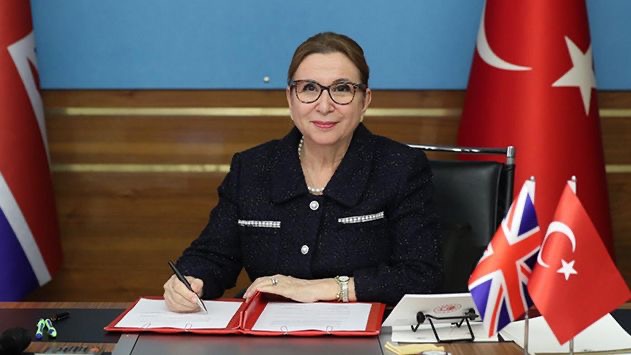ANKARA, TURKEY
Turkey and the UK Tuesday signed a historic free trade agreement, set to go into effect New Year’s Day, this Friday, Jan. 1.
“This is a historic day for Turkish-UK relations,” Trade Minister Ruhsar Pekcan said in a speech to the virtual signing ceremony based in the Turkish capital Ankara.
The landmark deal will ensure stronger trade between Turkey and the UK in the days to come, Pekcan underlined, adding that it leaves no uncertainty in the trade structure between the two countries.
“We are taking the first step towards further deepening our ties while maintaining 25-year gains from the Customs Union,” said Pekcan, referring to Turkey’s 1995 Customs Union with the EU, which Britain is making its final exit from this week.
“With the new deal, Turkey and the UK are pleased to meet businesspeople’s expectations and to keep our promises,” she added.
Absent a deal, about 75% of Turkish exports to the UK would be subject to tariffs, causing losses of some $2.4 billion, but the deal eliminates this risk, said Pekcan.
“We reached a tariff-free agreement, as planned, which includes all industrial and agricultural goods,” she said.
Stating that the trade volume between the two countries hit $15.1 billion in January-November, Pekcan said in 2019, Turkey’s exports to the UK – its second-largest export market – stood at $11.3 billion, while imports totaled $5.6 billion.
The UK’s investments in Turkey are around $11.6 billion, Pekcan said.
“I hope the deal will be reflected positively in bilateral investments,” she underlined.
Pekcan also said Turkey is eager to expand the pact in areas such as investments and services.
“We will discuss how we can improve the conditions for entering the agricultural market as well,” she added.
More ambitious trade deal to come
For her part, British Trade Minister Liz Truss said the pact lays the groundwork for a more ambitious UK -Turkey trade relationship in the days to come.
“The agreement is part of our plan to put the UK at the center of a network of modern agreements with dynamic economies,” she noted, saying there is greater trade potential in the areas of finance and biotechnology.
“In this sense, I believe that as two trading countries, from products, vehicles to other sectors, we can gain great momentum in the field of services and technology trade much faster.”
She also said Britons will be able to buy high-quality products, including white goods, manufactured in Turkey.
“Apart from this, it will also make a great contribution to the consumers to buy decent products at decent prices in agricultural products.”
Truss said that in the last two years, in the countdown to Brexit, the UK reached agreements with 62 countries – and the European Union – to cover £885 billion ($1.20 trillion) of UK trade.
“We are not only accelerating trade but also aiming to grow. Today we open a new page in the cooperation between Turkey and the UK.”
In a statement following the signing, the UK government said the deal covers trade worth more than £18 billion ($24.3 billion).
“Both countries have also committed to working towards a more ambitious free trade agreement in the future, which will go further than the current deal,” it said.
Vital UK-Turkey supply chains will also be protected for automotive manufacturers, such as Ford, which employs 7,500 people in the UK, it noted.
Also commenting on the deal, Stuart Rowley, the president of Ford of Europe, said:
“Ford welcomes the announcement today of a trade agreement between the two countries, and the speed with which it has been concluded underscores its importance to the economic prosperity of both countries.
“Given that Ford and [Ford-Turkish Koc Holding co-owned] Ford Otosan business constitutes more than 10% of the total trade volume between the UK and Turkey, this trade agreement is extremely significant for us and will help to secure jobs in both countries.”
Andy Burwell, director for international trade and investment at the Confederation of British Industry (CBI), also underlined the historic pact will bolster key supply chains across many industries after a year of pandemic disruption.

